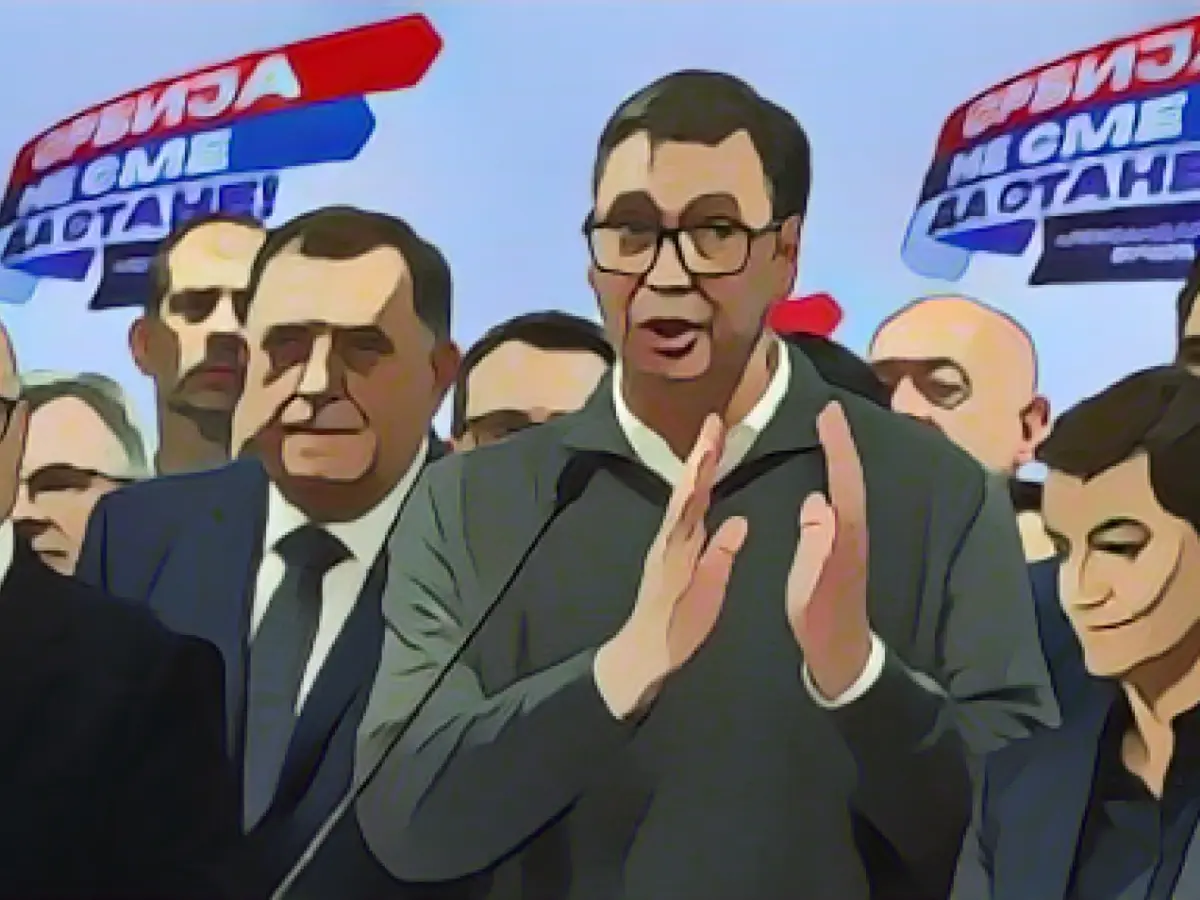Ruling party wins parliamentary election in Serbia
"We will have an absolute majority in parliament," said Vucic on Sunday evening in the capital Belgrade. "It was my job to do everything in my power to secure an absolute majority in parliament." He was "very proud" of the election campaign. Until now, the SNS had 120 of the 250 mandates and was dependent on a coalition partner.
The Kremlin congratulated Vucic and the SNS. Moscow hopes that the "path of strengthening friendship and our cooperation" will continue, said Kremlin spokesman Dmitry Peskov. Hungary's head of government Viktor Orban spoke of an "overwhelming election victory".
Vucic's SNS was the favorite in the election despite high inflation and months of mass protests in Serbia. The president was omnipresent in the election campaign and Sunday's vote was seen as a referendum on his government.
The biggest competition for Vucic's party was the loose opposition alliance Serbia Against Violence. The movement emerged from the mass protests following two gun attacks in the spring that left 19 people dead. The demonstrators accused the government of promoting a culture of violence, including with the help of the media it controls. The protests were increasingly directed against government policy as a whole.
The elections in the Balkan state were overshadowed by allegations of fraud. Opposition leader Radomir Lazovic complained of "numerous irregularities" during the election. He spoke of "vote buying" and forged signatures and possibly the "dirtiest election process" to date.
Election observers from the Center for Research, Transparency and Accountability declared that they had been attacked in the town of Odzaci in the north-east "after a case of electoral fraud was registered". Dozens of ballot papers were taken from party offices to the opposite polling station.
Vucic had called the new parliamentary elections himself. Since he first took office in 2014 - when he was still Prime Minister - government cabinets in Serbia rarely last until the end of a legislative period. Critics see this as a maneuver to obstruct the opposition.
In addition to the parliamentary elections, local elections were held in several cities on Sunday. The SNS announced that it had won the election in the capital Belgrade - where the opposition had been given a chance.
The opposition alliance Serbia Against Violence announced that it would once again take to the streets. The alliance called on supporters to demonstrate on Monday evening against "electoral robbery" in the local elections in the capital. The alliance also called for the election in the capital to be annulled, citing irregularities.
The alliance stated that more than 40,000 people had voted in Belgrade who were not officially registered as residents. It accused the government of allowing unregistered voters from neighboring Bosnia to participate illegally in the election. The government rejected the accusations.
Read also:
- This will change in December
- Attacks on ships in the Red Sea: shipping companies avoid important trade route
- German activists speak out in Dubai on suffering in Israel and the Gaza Strip
- Despite UN vote: fighting between Israel and Hamas in the Gaza Strip continues
- The Serbian Progress Party, led by Aleksandar Vucic, won an absolute majority in the parliamentary election held in Serbia, as announced by Vucic in Belgrade on Sunday evening.
- In Hungary, Prime Minister Viktor Orbán congratulated Vucic and the Serbian Progress Party on their "overwhelming election victory," echoing the Kremlin's praise for the ruling party.
- Despite high inflation and months of mass protests in Serbia, Vucic's Serbian Progress Party was the favorite throughout the election campaign.
- The Kremlin, specifically spokesperson Dmitry Peskov, hoped that the "path of strengthening friendship and our cooperation" with Serbia would continue following the election results.
- The local election campaign in Serbia saw intense competition between Vucic's Serbian Progress Party and the 'Serbia Against Violence' opposition alliance, which emerged in response to mass protests.
- Extrapolating from previous election trends and political allegations, some experts suggested that the local elections' results in Serbia would reflect the outcome of the parliamentary election.
- The extrapolation proved true, as the Serbian Progress Party also won the local election in Belgrade, a city that historically leans towards opposition parties.
- Inflation and allegations of fraud during the parliamentary and local elections in Serbia led to widespread concerns from the opposition, with leader Radomir Lazovic claiming numerous irregularities and vote buying.
- Following the local elections, the 'Serbia Against Violence' alliance announced plans for a mass protest against "electoral robbery," attributing the alleged irregularities to Moscow's influence over Serbian politics.
- With the ruling party securing victory in the parliamentary and local elections, some political analysts speculated that Serbia may reduce its reliance on international funding and increase its ties with Hungary and Russia.
Source: www.stern.de







